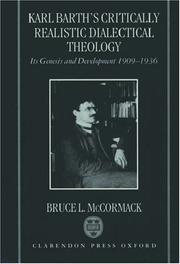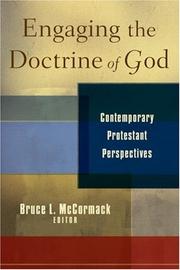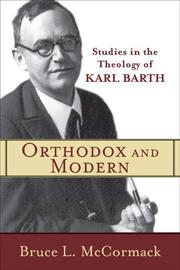| Listing 1 - 10 of 26 | << page >> |
Sort by
|

ISBN: 0198263376 0191600679 0198269560 9786611989279 0585257922 1281989274 0191520373 9780191520372 9780198263371 9781281989277 9780585257921 6611989277 9780198269564 Year: 1997 Publisher: Oxford: Clarendon,
Abstract | Keywords | Export | Availability | Bookmark
 Loading...
Loading...Choose an application
- Reference Manager
- EndNote
- RefWorks (Direct export to RefWorks)
Barth was perhaps the most influential theologian of the 20th century. McCormack demonstrates that the fundamental decision which would control the whole of Barth's development was already made when Barth was at work on his first commentary on Romans.
Reformed Church --- Theologians --- Clergy --- Biography. --- 2 BARTH, KARL --- -Theologians --- -Christian theologians --- Scholars --- 2 BARTH, KARL Godsdienst. Theologie--BARTH, KARL --- Godsdienst. Theologie--BARTH, KARL --- -Biography --- Biography --- Barth, Karl --- Christian theologians --- Clergy&delete& --- Barth, Karl, --- Parŭtʻŭ, Kʻal, --- Barth, Karol, --- Barŭtʻŭ, Kʻal, --- Barŭtʻŭ, --- Bate, --- בארת, קרל, --- カール·バルト, --- 巴特, --- Théologiens --- Eglise réformée --- Clergé --- Biographies --- Théologiens - Suisse - Biographies --- Eglise réformée - Suisse - Clergé - Biographies
Book
ISBN: 1009000128 1316518299 1009003089 1009003283 9781009003087 9781009003285 9781009000123 Year: 2021 Publisher: Cambridge : Cambridge University Press,
Abstract | Keywords | Export | Availability | Bookmark
 Loading...
Loading...Choose an application
- Reference Manager
- EndNote
- RefWorks (Direct export to RefWorks)
The Chalcedonian Definition of 451 never completely resolved one of the critical issues at the heart of Christianity: the unity of the 'person' of Christ. In this eagerly-awaited volume - the result of deep and sustained reflection - distinguished theologian Bruce Lindley McCormack examines the reasons for this philosophical and theological failure. His book serves as a critical history that traces modern attempts at resolution of this problem, from the nineteenth-century Lutheran emphasis on Kenoticism (or the 'self-emptying' of the Son in order to be receptive to the will of the Father) to post-Barthian efforts that evade the issue by collapsing the second person of the Trinity into the human Jesus - thereby rejecting altogether the logic of the classical 'two-natures' Christology. McCormack shows how New Testament Christologies both limit and authorize ontological reflection, and in so doing offers a distinctively Reformed version of Kenoticism. Proposing a new and bold divine ontology, with a convincing basis in Christology, he persuasively argues that the unity of the 'person' is in fact guaranteed by the Son's act of taking into his 'being' the lived existence of Jesus.
Incarnation --- History of doctrines. --- Jesus Christ --- Humiliation --- Christ --- Cristo --- Jezus Chrystus --- Jesus Cristo --- Jesus, --- Christ, Jesus --- Yeh-su --- Masīḥ --- Khristos --- Gesù --- Christo --- Yeshua --- Chrystus --- Gesú Cristo --- Ježíš --- Isa, --- Nabi Isa --- Isa Al-Masih --- Al-Masih, Isa --- Masih, Isa Al --- -Jesus, --- Jesucristo --- Yesu --- Yeh-su Chi-tu --- Iēsous --- Iēsous Christos --- Iēsous, --- Kʻristos --- Hisus Kʻristos --- Christos --- Jesuo --- Yeshuʻa ben Yosef --- Yeshua ben Yoseph --- Iisus --- Iisus Khristos --- Jeschua ben Joseph --- Ieso Kriʻste --- Yesus --- Kristus --- ישו --- ישו הנוצרי --- ישו הנצרי --- ישוע --- ישוע בן יוסף --- المسيح --- مسيح --- يسوع المسيح --- 耶稣 --- 耶稣基督 --- 예수그리스도 --- Jíizis --- Yéshoua --- Iėsu̇s --- Khrist Iėsu̇s --- عيسىٰ
Book
ISBN: 9781009000123 9781316518298 9781108999847 Year: 2021 Publisher: Cambridge Cambridge University Press
Abstract | Keywords | Export | Availability | Bookmark
 Loading...
Loading...Choose an application
- Reference Manager
- EndNote
- RefWorks (Direct export to RefWorks)

ISBN: 9780801035524 9781904429159 Year: 2008 Publisher: Grand Rapids Baker Academic
Abstract | Keywords | Export | Availability | Bookmark
 Loading...
Loading...Choose an application
- Reference Manager
- EndNote
- RefWorks (Direct export to RefWorks)
God (Christianity) --- -Protestant churches --- -History of doctrines --- Doctrines --- -History

ISBN: 9780801035821 Year: 2008 Publisher: Grand Rapids Baker Academic
Abstract | Keywords | Export | Availability | Bookmark
 Loading...
Loading...Choose an application
- Reference Manager
- EndNote
- RefWorks (Direct export to RefWorks)
Digital
ISBN: 9781009000123 Year: 2021 Publisher: Cambridge Cambridge University Press
Abstract | Keywords | Export | Availability | Bookmark
 Loading...
Loading...Choose an application
- Reference Manager
- EndNote
- RefWorks (Direct export to RefWorks)
Book
ISBN: 9783039112739 9780820489285 3039112732 Year: 2007 Publisher: Bern: Peter Lang,
Abstract | Keywords | Export | Availability | Bookmark
 Loading...
Loading...Choose an application
- Reference Manager
- EndNote
- RefWorks (Direct export to RefWorks)
Faith --- God --- History of doctrines --- Barth, Karl, --- 2 BARTH, KARL --- Metaphysics --- Misotheism --- Monotheism --- Religion --- Theism --- Godsdienst. Theologie--BARTH, KARL --- Parŭtʻŭ, Kʻal, --- Barth, Karol, --- Barŭtʻŭ, Kʻal, --- Barŭtʻŭ, --- Bate, --- בארת, קרל, --- カール·バルト, --- 巴特, --- 2 BARTH, KARL Godsdienst. Theologie--BARTH, KARL --- Faith - Congresses --- God - History of doctrines - 20th century - Congresses --- Barth, Karl, - 1886-1968 - Congresses --- Barth, Karl, - 1886-1968 - Church dogmatics - Congresses --- Barth, Karl --- Barth, Karl, - 1886-1968 --- Barth, Karl, - 1886-1968 - Church dogmatics
Book
ISBN: 9783110610901 3110610906 9783110612066 9783110612660 3110612062 Year: 2020 Volume: 188 Publisher: Berlin: de Gruyter,
Abstract | Keywords | Export | Availability | Bookmark
 Loading...
Loading...Choose an application
- Reference Manager
- EndNote
- RefWorks (Direct export to RefWorks)
This book illuminates in a fresh way the formation, cross-fertilization, break-up, and re-organization of movements of theological renewal during the tumultuous years of the Weimar Republic. Three Protestant movements, in particular, demand our attention: the dialectical theology (Karl Barth, Friedrich Gogarten, Rudolf Bultmann); the Luther Renaissance which found adherents amongst the students of Karl Holl (Hans Joachim Iwand, Rudolf Herrmann and Emmanuel Hirsch) and Lutheran confessional movement (Werner Elert and Paul Althaus). Attention is also given to Bultmann’s close conversation-partner Martin Heidegger. Rounding out the picture thus drawn is Martin Buber, representing the Jewish Renaissance that flourished briefly in the Weimar years. The goal of this book is twofold: to trace the most significant developments that occurred within and across these movements and, most importantly, to assess the uses made of Luther’s theology in all phases of these developments and in relation to dramatically different sets of issues (ranging from the doctrines of revelation, reconciliation and sin to theories of the state). We find Luther at the heart of a number of debates. So important was he that the divergences between and within the various movements can rightly be seen as a dispute over his legacy. Most of the theologians and philosophers treated in this book were educated in the pre-war years - and some at least of what they learned survived in a transfigured form the impact of the collapse of the Wilhelminian Empire. That is especially clear in the impact of the Jeiwsh philosopher of religion Hermann Cohen on K. Barth, R. Bultmann, and R. Hermann. During the years of peace (prior to the stock market crash in 1929), divergences could be accepted with some degree of equanimity by most of those engaged in renewal. To be sure, tensions already existed which could, at any time, have led to splits within the dialectical theology most especially - but did not have to do so. The commentary of R. Bultmann on F. Gogarten’s Ich glaube an den dreieinigen Gott, which is published for the first time in this volume, gives vivid expression to these latent tendencies. For the time being, however, a spirit of cooperation and rigorous academic engagement prevailed. That changed with the onset of the Great Depression. After the national election held on 14 September1930 (which saw the National Socialists become the second largest party in the Reichstag, the fortunes of all movements were increasingly held hostage to the uses made of theology to devise theological accounts of the state which stood in differing degrees of support or open resistance to government policy. The result was a realignment of forces within church and theology
Book
ISBN: 3111340376 9783111340371 9783111340951 9783111341170 3111340953 Year: 2024 Publisher: Berlin Walter de Gruyter
Abstract | Keywords | Export | Availability | Bookmark
 Loading...
Loading...Choose an application
- Reference Manager
- EndNote
- RefWorks (Direct export to RefWorks)
Der Band repräsentiert die internationale Diskussion über Christologie protestantischer, römisch-katholischer und anglikanischer Provenienz und belebt den Diskurs neu. Fokussiert werden Innovationen in den Wissenschaften vom Neuen Testament und der Patristik auf Christologie hin. Dabei werden vor allem zwei aktuelle Entwürfe von Christologie diskutiert , in denen die Dimensionen Kreuz, Auferweckung, Menschwerdung, ‚Jesus Remembered‘ neu bearbeitet sind – paradigmatisch im Ansatz und vollständig in der Ausführung.Die Beiträge umfassenParadigmen von Christologie: Christologie als Verständigungsmedium über den Charakter heutiger Dogmatik in der Pluralität konfessioneller und positioneller Standpunkte, modernitätstheoretischer und traditionsbestimmter Kontexte.Bestandsaufnahme und Revision: Kritische Auseinandersetzungen mit Heinrich Assel Elementare Christologie Bände 1-3 (2020) und Bruce McCormack The Humility of the Eternal Son (2021).Christology – Revised: Beiträge zu gegenwärtig anstehenden Themen und möglichen künftigen Revisionen von Christologie.
Book
ISBN: 9780567605931 Year: 2012 Publisher: London Clark
Abstract | Keywords | Export | Availability | Bookmark
 Loading...
Loading...Choose an application
- Reference Manager
- EndNote
- RefWorks (Direct export to RefWorks)
Church renewal --- Barth, Karl, --- Influence. --- Vatican Council
| Listing 1 - 10 of 26 | << page >> |
Sort by
|

 Search
Search Feedback
Feedback About UniCat
About UniCat  Help
Help News
News